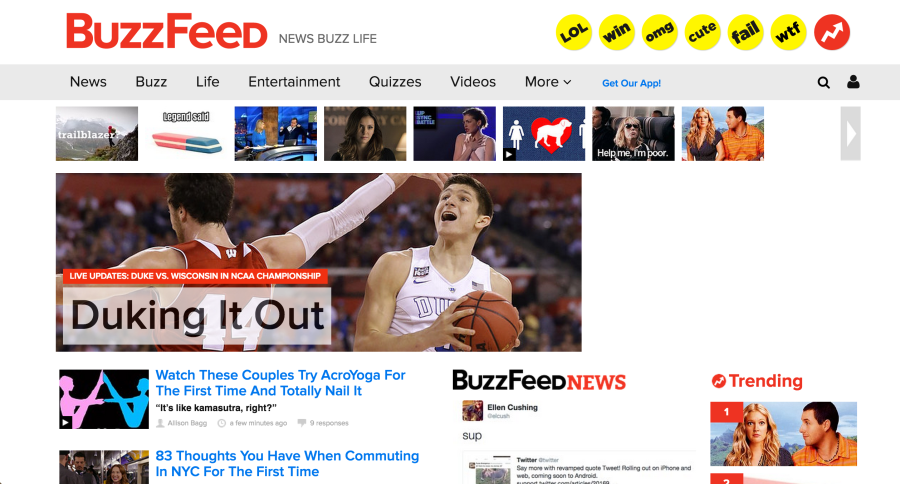What’s the latest buzz?
In the past year, Buzzfeed has taken over some Graded high schoolers’ lives, including my own. With its articles, videos, and quizzes, Buzzfeed offers a seemingly endless queue of entertainment that will certainly consume most of your time and help you procrastinate on whatever work you are putting off. IB students know this predilection all too well.
For those may have not heard of the site, Buzzfeed, co-founded in 2006 by Jonah Peretti who also co-founded the Huffington Post, is an internet aggregate of articles, videos, and almost anything that can be humanly conceived and subsequently produced via online media. It’s where people can catch up on the latest gossip, read fascinating stories and personal anecdotes, watch hilarious videos, peruse lists on the most arbitrary topics, and witness news alerts on disturbing findings from the most recent high-profile international cases or events. In fact, I learned about the Boko Haram attack in Nigeria earlier this year from Buzzfeed, as most other news sources, including BBC and CNN, were reporting primarily on Charlie Hebdo (if you think “je suis Charlie,” read this). Buzzfeed offers fresh perspectives for otherwise insipid discussions and helps its readers understand topics more holistically, especially through minority-oriented and inclusive lenses.
Furthermore, Buzzfeed is more dimensional than other conventional news sources. It has popularized the use of lists, generally shorter articles, and alternative venues to succinctly convey information to its readers. Because of its convenient, fast-paced, and user-friendly structure, it has become growingly popular with our generation, evidenced through its articles popping up all over social networks, including Facebook, Twitter, and Tumblr.
Tomas Chamorro-Premuzic, a business psychology professor at the University College London, tried to uncover why some of us are obsessed with this internet hub in his Guardian article “18 Human Traits That Explain Why Readers Can’t Get Enough of Buzzfeed.” The title is a reference to the site’s use of numeric lists. In his article, some reasons he gives include that we are “visual creatures” who are more drawn to photographs and GIF’s instead of blocks of text and that we are “too lazy” to say what we mean, so we rely on Buzzfeed writers to do it for us, often sardonically.
Another explanation he gave is that most of us are “quite average,” meaning many of us share similar interests, particularly in entertainment. Because Buzzfeed depends on “sharing popular content,” we flock to the site knowing articles will be based on something we enjoy. In the case that we don’t find something we enjoy, many of us will at least try to discover something that we could potentially like with subconscious motive of keeping up with the latest trends. Quite simply, Buzzfeed generates content that it knows most of us will want to see. Chamorro-Premuzic provides some other explanations for our behaviors, but regardless of the justification, we continue to peruse the site’s peculiarly amusing and sometimes baffling articles.
So, if you’re a stranger to the site, if you have an hour to spare or even if you have no time at all, visit Buzzfeed and wander through its meadows of procrastination-inducing content.
Source: theguardian.com

A senior in his third and final year as part of the Talon, Michael serves as co-Editor-in-Chief alongside Faria Nasruddin. Prior to being Editor-in-Chief,...











